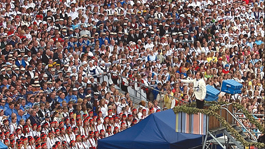home | metro silicon valley index | movies | current reviews | film review

MOSH PIT: The Estonia song festival called Laulupido puts Woodstock to shame.
Estonish Me
'The Singing Revolution': Stand up and cheer for the black, blue and white
By Richard von Busack
ODD THAT there are two documentaries opening this week on choral groups, The Singing Revolution and Young@Heart, both with fascinating subjects, both overnarrated to a fare-the-well. Any dedicated micropatrologist will want to see The Singing Revolution. It is the definitive film to date about the history of postwar Estonia. It was a hit at that small but determined nation's Black Nights Film Festival. It includes this quotable comment on Estoniamismo by the musicologist Venno Laul: "We are so few in number that we must emphasize that we exist." Certainly, the story of how Estonia got out of the USSR would honor a country many times its size. A nation with two bedfellows like the USSR and the Third Reich doesn't get much sleep. All the horrors of World War II were visited on the Estonian citizens. Some, like the resistance fighter Enn Sarv, interviewed here, were guests in both Hitler's and Stalin's camps. After the war was over, and the country was illegally relinquished to the USSR, Estonia's once-every-five-years song festival the Laulupidu became a rallying point for patriotic hymns. Odd that the Soviets, who always used their love of classical music to prove their civilizing mission, were undone by the very chorales they promoted.
It takes real talent to make such a vivid story dull and repetitive, and in the first half of the film co-directors James and Maureen Castle Tusty demonstrate this talent. Narrator Linda Hunt's account of World War II and its aftermath reiterates dates over stock footage, summing and resumming up the horror of exiles: "The Estonians sang ... and fought ... and survived. ... All that singing couldn't prevent the problems." At one point, a title card tells us that 1969 was the 100th anniversary of the first Laulupidu; it is followed by Hunt enunciating, "This was the 100th anniversary of the first Laulupidu" or words to that effect. Margaret Thatcher herself couldn't have gnashed richer syllables over Soviet perfidy. Speaking of bedfellows, the film's PR is done by CRC Public Relations, those folks who sold you the Swift Boat campaign, Regnery Publishing and the National Abstinence Education Association.
Fortunately, Hunt takes five during the more compelling last half of the film. The immense choral singing festivals, including some 25,000 performers, hatched peaceful resistance movements that helped issue forth a free Estonia. The Baltic republic's decision to face down the Red Army during the 1991 coup actually preceded Boris Yeltsin's withdrawal of Russia from the USSR. Good firsthand interviews include the national hero Juri Joost, one of the two Estonian policemen who guarded the nation's TV tower against Soviet tanks. We also see a surviving member of the Forest Brothers, a guerrilla resistance group that held out against the Russians from World War II to the late 1970s. These are obviously people who love their freedom, and it's just unfortunate that this documentary about them is so determinedly superficial and upbeat.
![]() THE SINGING REVOLUTION (Unrated; 94 min.), a documentary by James and Maureen Castle Tusty, opens May 2 at Camera 3 in San Jose. Director James Trust will be at the theater to talk about his film after the 1:50, 4:20 and 6:50pm screenings on May 3, and he will introduce the 9:20 showing.
THE SINGING REVOLUTION (Unrated; 94 min.), a documentary by James and Maureen Castle Tusty, opens May 2 at Camera 3 in San Jose. Director James Trust will be at the theater to talk about his film after the 1:50, 4:20 and 6:50pm screenings on May 3, and he will introduce the 9:20 showing.
Send a letter to the editor about this story.
|
|
|
|
|
|